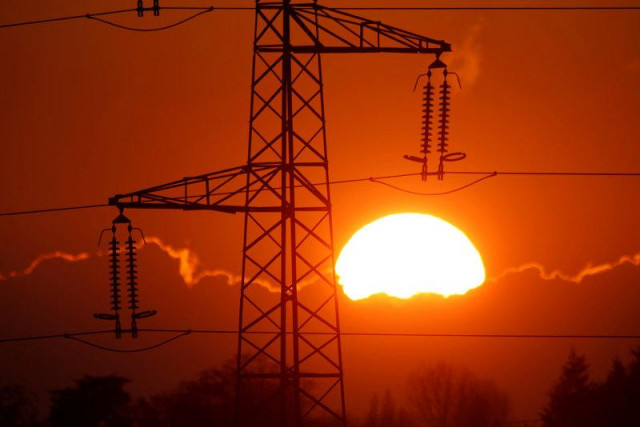Chinese firm offers bid for CASA transmission line contract
Bid is currently going through a technical evaluation process

Electrical power pylons of high-tension electricity power lines are seen at sunset. PHOTO: REUTERS
TBEA manufactures power transformers and other electrical equipment as well as develops transmission projects.
The transmission line is estimated to be spread over 750 km, 16% of which will pass through Tajikistan, 75% through Afghanistan and 9% through Pakistan.
According to officials, the bid was opened on May 11 and it was going through a technical evaluation process.
Chinese firm gets nod for setting up power plant
TBEA has also participated in the bidding process initiated for setting up two converter stations in Pakistan and Tajikistan for electricity transmission under the Casa-1,000 project. It is currently being evaluated and later financial bids will be invited.
For this project, the Islamic Development Bank will provide financial assistance. The bank has agreed to extend $35 million initially, but later it will provide the required financing.
An official said the technical bids invited for setting up the converter stations - which convert direct current into alternating current or the reverse - were opened on May 15. Five companies made offers to win the contract including Alstom of France, GE (United States), Siemens (Germany), ABB (Sweden-Switzerland) and TBEA.
“A technical evaluation is going on and Pakistan and Tajikistan want to open financial bids by the middle of August,” the official said.
He revealed that Afghanistan had also received bids from Indian companies for building the transmission line, but Pakistan objected and asked Kabul to stop the process.
He said Islamabad first wanted to complete the process for the award of contract for the two converter stations before undertaking the transmission line project.
The World Bank has pledged some financing for the converter station in Pakistan and will also provide more funds required for the project.
He pointed out that former member energy of the Planning Commission had underlined the need for laying an underground transmission line, but the member was removed later and the commission had cleared the project.
China to invest $50b to develop Indus River Cascade
The project will now be tabled before the Executive Committee of National Economic Council (Ecnec) for approval.
The regulator - National Electric Power Regulatory Authority (Nepra) - has approved a tariff of 9.41 cents per unit for electricity import from the Central Asian states - Tajikistan and Kyrgyzstan.
This includes 5.15 cents per kilowatt-hour (kWh) in energy charges, 2.91 cents per kWh in transmission charges, 1.25 cents per kWh in transit fee for Afghanistan and 0.10 cent per kWh in wheeling charges for Tajikistan.
Pakistan and Tajikistan have also formed a joint working commission that was also working on a second transmission line via northern areas of Pakistan. This will be called second Casa power import project that will meet further energy needs of Pakistan.
Tajikistan is one of the richest countries in terms of hydroelectric power resources. Four per cent of the world’s hydroelectric energy resources and 53% of the resources in Central Asia belong to Tajikistan.
At present, hydroelectric power production potential of the country stands at 527 billion kWh annually, but only 4-5% of that is being used. Thus, one of the solutions for the energy problem is the construction of the giant Rogun hydroelectric power plant.
Published in The Express Tribune, August 3rd, 2017.
Like Business on Facebook, follow @TribuneBiz on Twitter to stay informed and join in the conversation.



















COMMENTS
Comments are moderated and generally will be posted if they are on-topic and not abusive.
For more information, please see our Comments FAQ